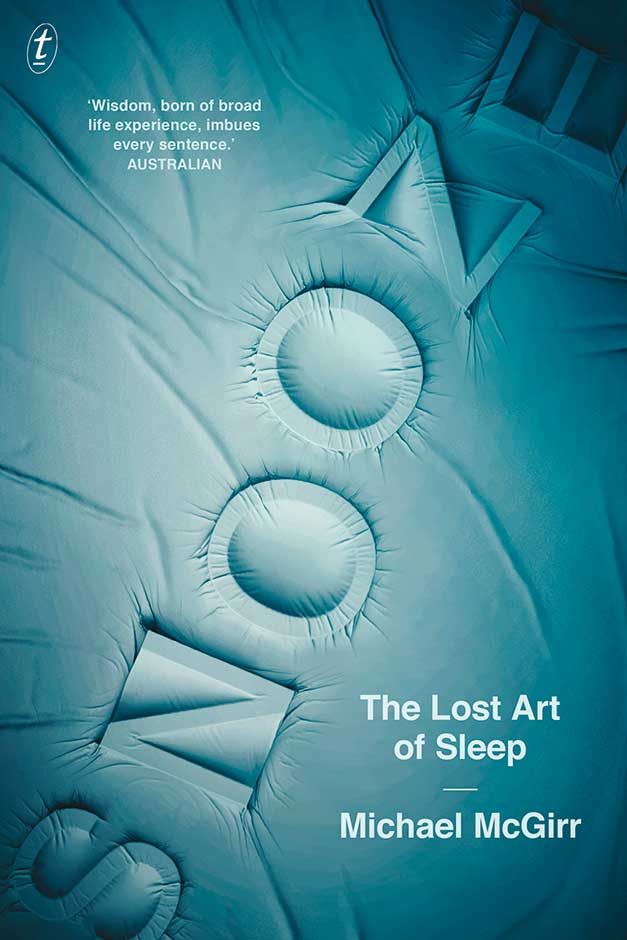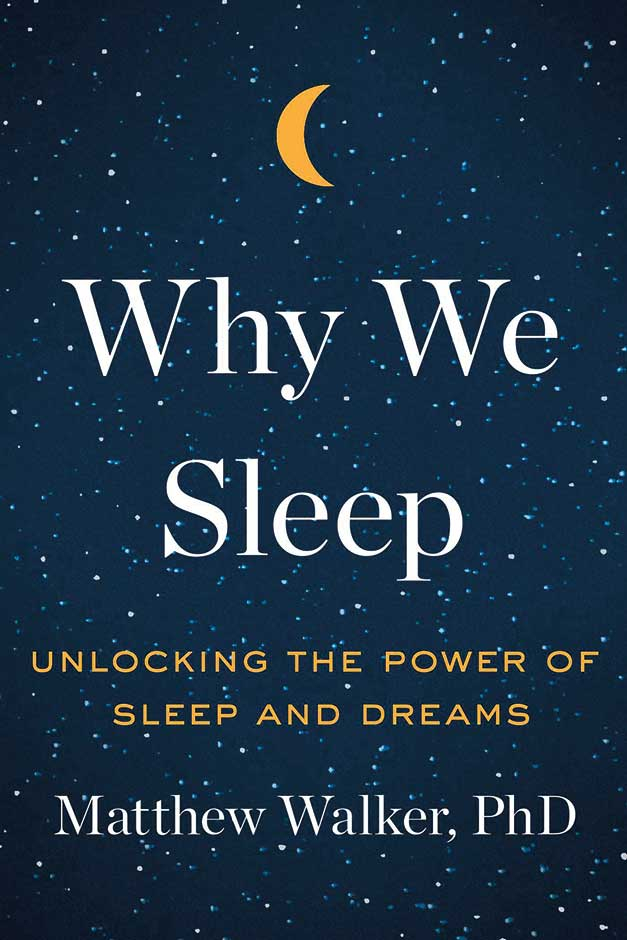You’re really asking for it when you name your book Snooze or Why We Sleep. A reviewer is tempted to dismiss the former by saying that it lives up to its title and the latter by replying, “Because of doorstop tomes like yours, pal!” Fortunately, the respective authors of these books — Michael McGirr and Matthew Walker — turn out to be good company: congenial, often funny narrators, each of whom, in his own way, offers a thoughtful tour through the still dimly understood state of being asleep.
Walker, a professor of neuroscience and psychology at the University of California, Berkeley, even goes so far as to pre-emptively acknowledge his book’s potential soporific powers. An evangelist for the mental and physical benefits of sleep, he writes, “Please, feel free to ebb and flow into and out of consciousness during this entire book. I will take absolutely no offense. On the contrary, I would be delighted.”
McGirr’s is the more personal work of the two. Twenty years ago, he was diagnosed with sleep apnea, a condition in which one’s slumber is repeatedly interrupted by temporary cessations in breathing. A night’s testing in a sleep lab, with electrodes affixed to his scalp, chest and legs, revealed McGirr’s case to be severe. He woke up 287 times, though he was unaware of these serial awakenings until his doctor informed him of them. McGirr’s apnea was alleviated by a device known as a CPAP (continuous positive airway pressure) system, a nose-nozzle contraption that makes its wearer look a little like Darth Vader unmasked. Yet just as McGirr was poised to overcome a lifetime’s worth of exhaustion, he and his wife, already the parents of a young son, had twins. The ensuing ordeal of irregular rest and ad hoc strategies to get some shut-eye (for parents and infants alike) prompted McGirr, a writer and teacher based in Melbourne, Australia, to ponder the very nature of sleep and wakefulness as human conditions.
By Michael McGirr, Pegasus Books, 311 pages, $27
Snooze is the result of this pondering. A former Jesuit priest whose high-decibel snoring caused his colleagues no small amount of torment (“I could make a monastery sound like a factory”), McGirr pursues his chosen subject in a Jesuitical spirit of holistic inquiry, contemplating sleep as it has been considered in literature, science, history and his own experience. He turns, for example, to Charles Dickens, whose difficult relationship with sleep presented itself in both his nonfiction (his vivid 1861 essay “Night Walks” details the after-hours strolls he took through London as a restless younger man) and in his novels. Dickens’s first, The Pickwick Papers, features a character, Joe, who suffers from a form of sleep apnea, “a fat and red faced boy in a state of somnolency who divided his time into small allotments of sleeping and eating.”
In Thomas Edison, McGirr finds a forebear of today’s tech entrepreneurs, a brilliant but arrogant man who regarded sleep and nightfall as nuisances to be vanquished. “For Edison, there were never enough hours in the day,” McGirr writes. “So he made more.” The long-lasting incandescent light bulb, which Edison perfected in 1879, was as much a profound upending of the natural order as it was a huge technological advance — the first step on the path to our current age of screen addiction, overlong workdays and sleep deficits.
McGirr ranges far and wide in his considerations of sleep and sleeplessness, from his esoteric take on classical Greco-Roman literature (“If ‘The Odyssey’ is a book about getting home to bed, ‘The Aeneid’ is a book about getting out of it”) to the story of an Australian woman who died after taking the anti-insomnia drug zolpidem, marketed as Stilnox in her country and as Ambien in ours. But these varied pensEes are rather randomly sequenced and don’t hang together especially well. Snooze is no snooze, and in its best moments is a reflection of its author’s evident intellect and charm. But it becomes rather drifty and slack as it progresses, building to no particular climax or conclusion.
By Matthew Walker, Scribner, 360 pages, $27
Why We Sleep, by contrast, is a book on a mission. Walker is in love with sleep and wants us to fall in love with sleep, too. And it is urgent for him. He makes the argument, persuasively, that we are in the midst of a “silent sleep loss epidemic” that poses “the greatest public health challenge we face in the 21st century.”
Walker is no dilettante. He presides over Berkeley’s Sleep and Neuroimaging Lab, where he and his team, along with their peers at other institutions, have made significant strides over the last 20 years in understanding the restorative powers of sleep, and, correspondingly, the dire consequences of not getting enough of it. The upshot: “Sleep is the single most effective thing we can do to reset our brain and body health each day — Mother Nature’s best effort yet at contra-death.” Someone should put that last phrase on a T-shirt.
As information-dense as Why We Sleep is, Walker is adroit at presenting his findings and their implications in language accessible to the lay reader. A healthy night’s sleep lasts about eight hours, and is divided between REM (rapid-eye movement) sleep, in which the brain is as active as it is when its owner is awake, and NREM (non-REM) sleep, a deeper sleep state that predominates in the first half of the night. Both of these states (and there are further sub-states within NREM sleep) serve a multitude of purposes. NREM sleep, for example, is crucial to memory retention, and to acquiring and refining our motor skills. REM sleep plays a role in our abilities to overcome negative feelings, read other people’s emotions and solve problems.
Like McGirr, Walker observes that the last 100-odd years of industrialization, urbanisation and purported progress have been hell on sleep. Only in his case, he has all manner of statistics and clinical studies to back him up. It really is true that you’ll have a harder time falling asleep after reading a book on an LED device than you will after reading one printed on old-fashioned paper; the blue light emitted by an iPad suppresses your brain’s natural release of melatonin, the hormone that induces sleepiness, by over 50 per cent. Then there are the deleterious effects that sleep deprivation has on such physiological functions as the brain’s regulation of blood pressure; per Walker, adults aged 45 and older who get fewer than six hours of sleep a night are 200 per cent more likely to suffer a heart attack or a stroke than those who get their full sleep allotment.
One especially winning attribute of Walker is that he’s not a scold. He frames his suggestions for more healthful sleep habits not as a series of eat-your-Wheaties admonitions, but as wondrous, uplifting improvements in quality of life. (Among the most simple and effective: “Establish a regular bedtime and wake-up time, even on weekends.”) And he offers attaboy praise to companies that have evolved out of the machismo-infused all-nighter ethos of yore and into a more enlightened approach to employee wellness. Nike and Google come in for kudos for incorporating “nap pods” into their offices and for having adopted a more flexible approach to employee work hours, acknowledging that some people are “morning larks,” naturally disposed to rise and do their best work early, while others are “night owls,” more inherently inclined to thrive on the late shift.
Very occasionally, Walker’s zeal tips into zealotry. He implies that women should abstain completely from alcohol consumption during pregnancy, noting that just a glass or two of wine will temporarily inhibit a foetus’s REM sleep and that “every hour of REM sleep appears to count” — a speculation that gives short shrift to the expectant mom and the benefit that a moment’s relaxation might bring her. But, generally, Why We Sleep mounts a persuasive, exuberant case for addressing our societal sleep deficit and for the virtues of sleep itself. It is recommended night-table reading in the most pragmatic sense.
–New York Times News Service
David Kamp is a contributing editor for Vanity Fair.











